Key takeaways:
- Understanding melody, harmony, and lyrics enhances emotional depth and storytelling in songwriting.
- Vivid imagery and simplicity in lyrics can transform songs, making them more relatable and impactful.
- Embracing vulnerability and personal experiences strengthens connections with listeners.
- Collaboration and routine practice can lead to creative breakthroughs and improved songwriting skills.
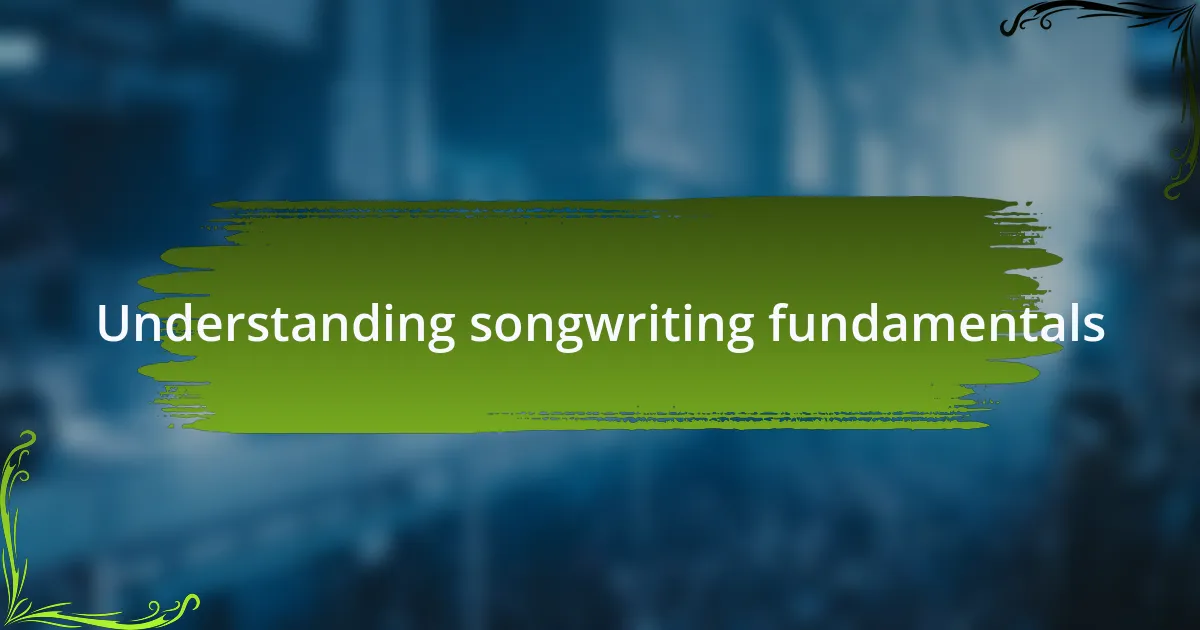
Understanding songwriting fundamentals
Songwriting fundamentals revolve around the pivotal elements of melody, harmony, and lyrics, each playing a crucial role in conveying emotions. For me, the moment a catchy melody comes to mind is electric; it feels like capturing lightning in a bottle. Have you ever felt that same rush when a melody just clicks? It’s in those fleeting seconds that I realize the power of musical simplicity.
Harmony adds depth to a piece, allowing the melody to breathe and resonate with listeners. I remember working on a song in which I experimented with unexpected chord progressions. The shift from major to minor unexpectedly transformed the song’s emotional landscape, and it made me wonder: how can a small alteration create such a profound impact? Understanding these transitions can truly elevate a composition, inviting the audience on a deeper journey.
Furthermore, lyrics serve as the storyteller of the song, merging personal experiences with universal themes. I’ve often found myself pouring my heart into lyrics during challenging times; it felt like therapy. Isn’t it fascinating how the right words can articulate what many people feel but cannot express? This connection between the songwriter and the listener is the essence of songwriting — a shared emotional experience that transcends individual stories.
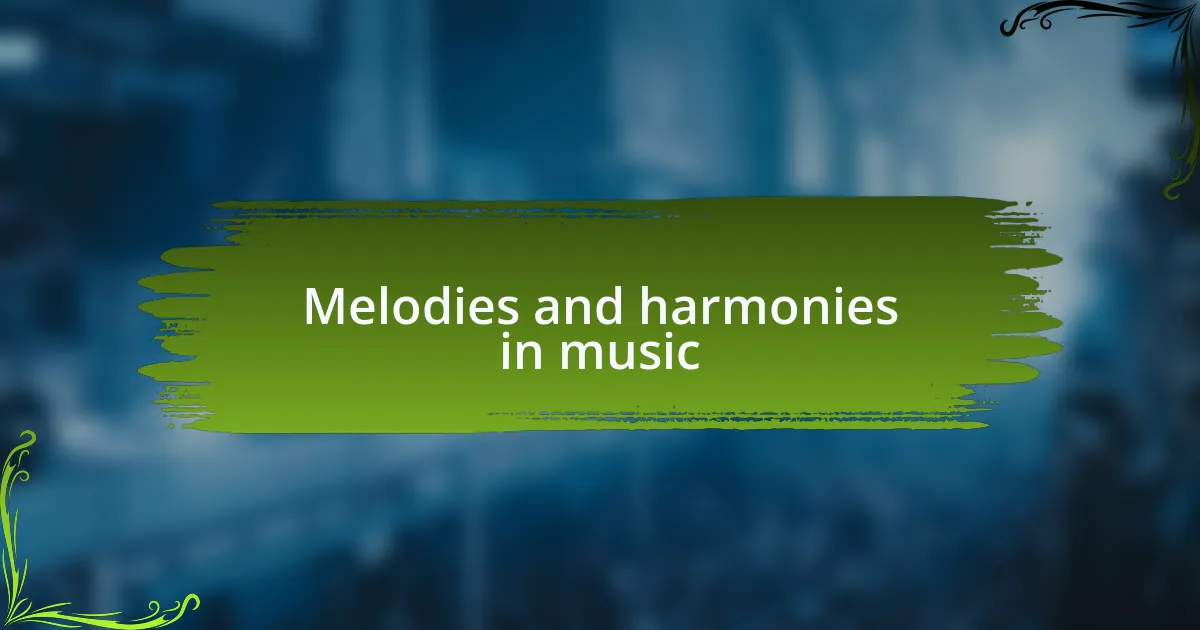
Melodies and harmonies in music
Melodies undeniably form the core of a song’s identity, capturing attention and igniting emotions. I often find that a single memorable note can linger in my mind for days, sparking creativity in unexpected ways. Have you ever experienced that moment when a melody feels like it’s speaking to you? It’s a reminder of how melodies can evoke nostalgia, joy, or even sadness, all within just a few notes.
When I think about harmony, I can’t help but reflect on one of my early projects where I layered harmonies beneath a simple melody. The richness it added transformed the entire atmosphere of the song. It’s amazing how harmonies can shift the emotional weight from uplifting to contemplative with just a few tweaks. This interplay between melody and harmony has taught me that music is more than sound; it’s an emotional dialogue that resonates at different levels.
In my songwriting journey, I’ve learned that the relationship between melody and harmony can either enhance or detract from the story being told. I once wrote a song where the harmony clashed with the intended mood, creating a dissonance that felt jarring. That experience opened my eyes to how crucial it is to ensure that every element supports the overall message. So, have you ever considered how you’d modify a melody to better align with its harmonies? It’s through this exploration that I’ve come to appreciate the intricate dance between these two fundamental aspects of music.
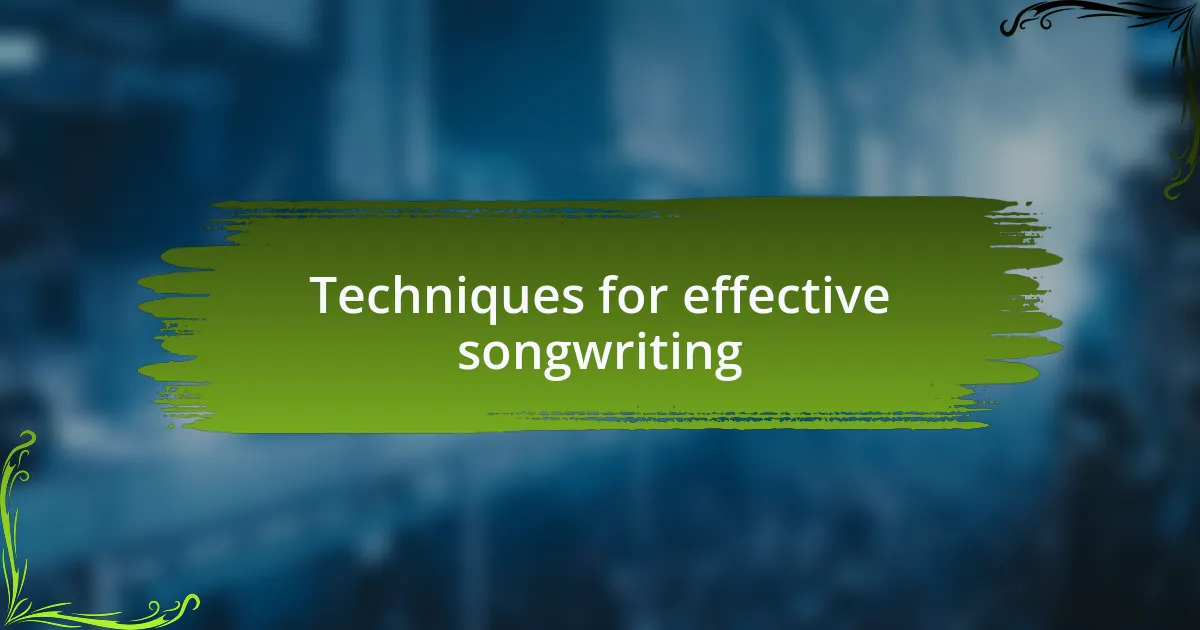
Techniques for effective songwriting
When it comes to songwriting, I’ve discovered that using vivid imagery can transform lyrics from ordinary to extraordinary. I remember a time when I wrote a chorus about a storm, but instead of just saying “it rained,” I painted a picture of dark clouds swallowing the sun. That small detail brought the emotion to life. Have you noticed how specific images can make a listener feel like they’re living the experience?
Another technique that has been a game-changer for me is the power of simplicity. I once tried to incorporate complex themes and intricate language into a song, but it ended up feeling overdone. When I stripped it back to simple, heartfelt phrases, the message resonated much deeper. It made me realize that sometimes less truly is more. Do you ever find that your best ideas emerge when you keep things straightforward?
Finally, I’ve learned the importance of structure in songwriting. Crafting a song involves more than just creativity; it can be a strategic process. In a past collaboration, I took the time to outline the verses, chorus, and bridge meticulously. This not only kept us on track but also highlighted the emotional progression. Have you ever mapped out a song? It can offer clarity and enhance the overall flow, making the songwriting experience smoother and more rewarding.
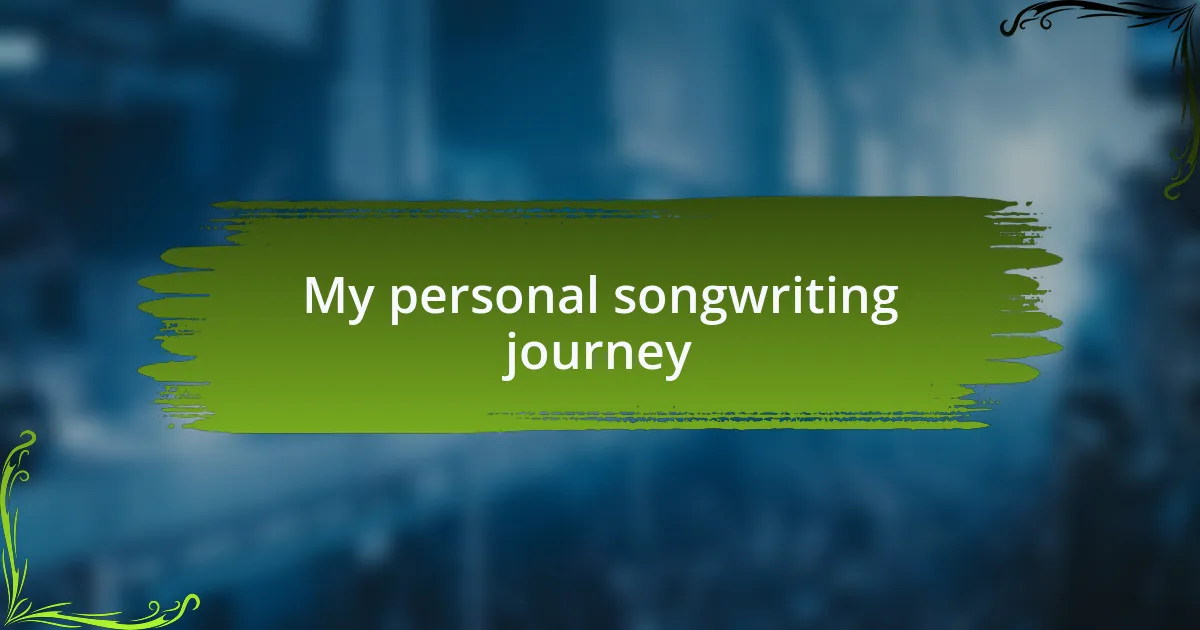
My personal songwriting journey
My personal songwriting journey has been filled with moments of self-discovery and growth. I recall sitting on my bedroom floor, guitar in hand, feeling utterly lost after a breakup. It was through writing my first authentic song about that heartbreak that I realized the cathartic power of music. Have you ever found solace in expressing your feelings through art?
As I dove deeper into songwriting, I discovered that my creative process isn’t always linear. I often find inspiration in the most mundane experiences, like sipping coffee at a café or taking a long walk. One day, I jotted down a few lines about an old couple I saw holding hands—simple yet poignant. That unexpected spark became a heartfelt ballad that taught me how rich everyday life can be as a source of inspiration. Isn’t it fascinating how much beauty is hidden in the routine chaos of life?
There have been times when vulnerability scared me, yet those moments became some of my strongest songs. I once wrote a piece that exposed my struggles with self-doubt, and sharing it with others felt like stepping off a cliff. Surprisingly, the feedback was overwhelmingly positive, showing me that authenticity resonates with listeners. How often do you invite vulnerability into your own creative work? Embracing those raw feelings not only strengthens my songwriting but also connects me more deeply with my audience.
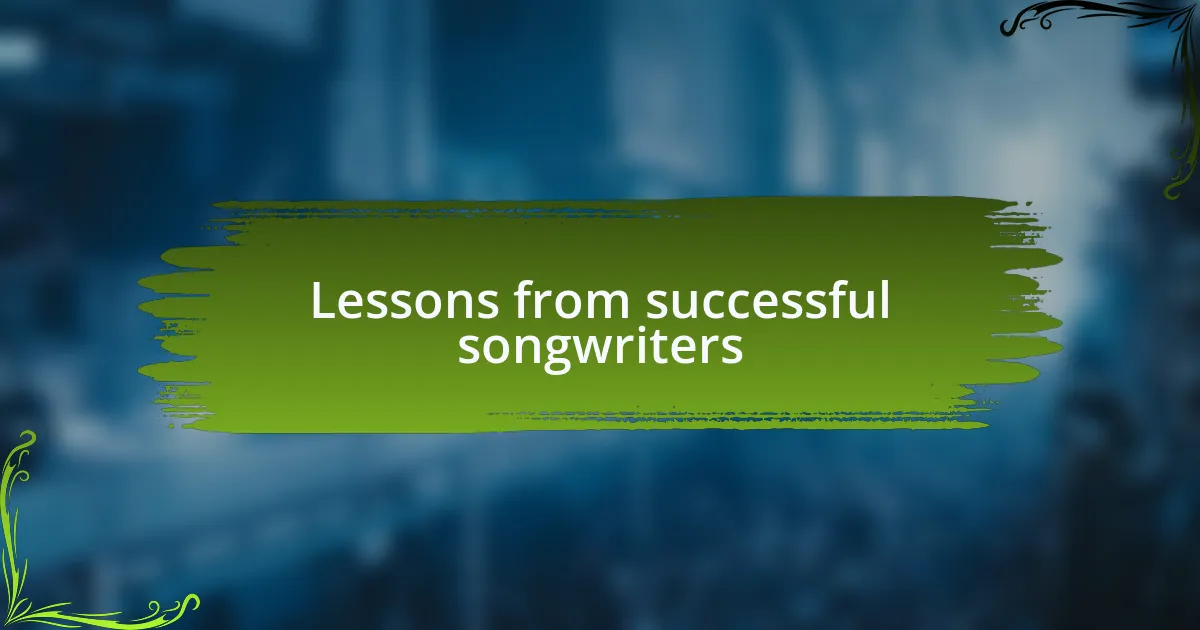
Lessons from successful songwriters
Successful songwriters often emphasize the importance of storytelling in their work. I remember a conversation I had with a seasoned songwriter at a workshop. He shared how crafting a narrative keeps listeners engaged, reminding me of the impact a well-told story can have in evoking emotion. Have you ever noticed how certain songs transport you to a different time or place through their lyrics? That’s the magic of connecting with listeners on a deeper level.
Another lesson I’ve garnered from observing prolific songwriters is the art of collaboration. I once co-wrote a song with a friend, and the experience was eye-opening. We combined our different styles and perspectives, which not only enriched the song but also taught me that collaboration can spark creativity in ways solo efforts cannot. Have you explored the power of partnering with other artists in your creative pursuits?
Lastly, many successful songwriters prioritize discipline in their craft, creating a routine that nurtures creativity. I experienced this firsthand during a songwriting challenge where I wrote a song every day for a month. At first, it felt daunting, but by the end, I discovered that making songwriting a daily practice greatly improved my skills. How often do you dedicate time to your craft? Establishing a routine may just lead you to unexpected breakthroughs and inspiration.
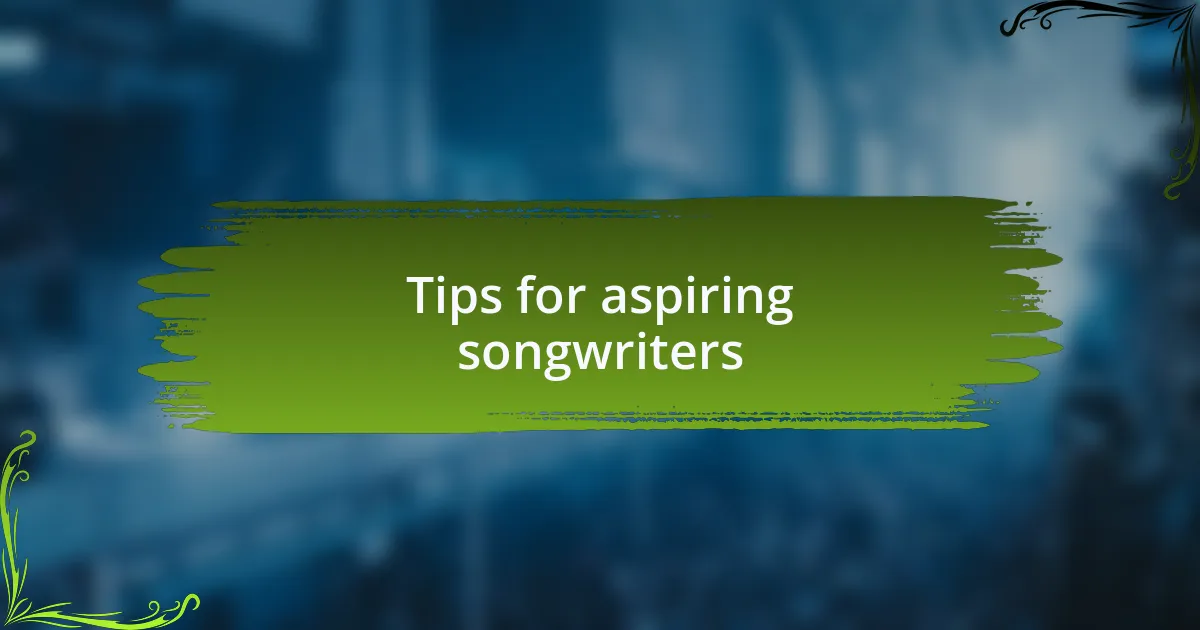
Tips for aspiring songwriters
When diving into songwriting, I’ve found that keeping a journal can be an incredible resource. I started jotting down my thoughts, emotions, and snippets of conversations I overheard. Often, I would stumble upon phrases or feelings that inspired entire songs. Have you ever felt that a single line can resonate deeply and spark a new creation?
Another key tip for aspiring songwriters is to embrace vulnerability in your lyrics. I learned this during one particularly tough period in my life when I penned a song about my struggles. Sharing my authentic feelings not only resonated with others but also allowed me to connect with listeners on a profound level. Isn’t it amazing how our most personal experiences can create the strongest connections in music?
Lastly, don’t shy away from playing with different musical styles. I once experimented with blending genres, combining folk elements with pop melodies. This exploration opened my eyes to new possibilities and led to unexpected lyrical inspirations. Have you considered stepping out of your comfort zone musically? It could lead to incredible artistic growth and originality in your songwriting.